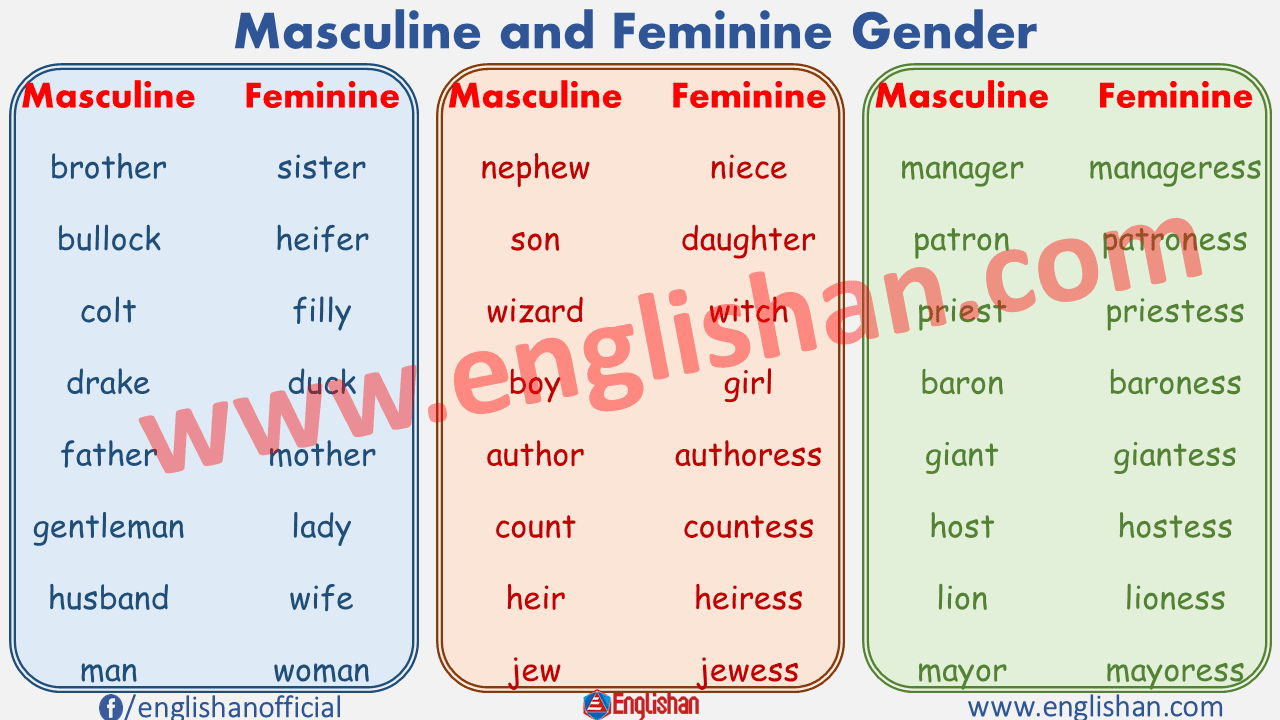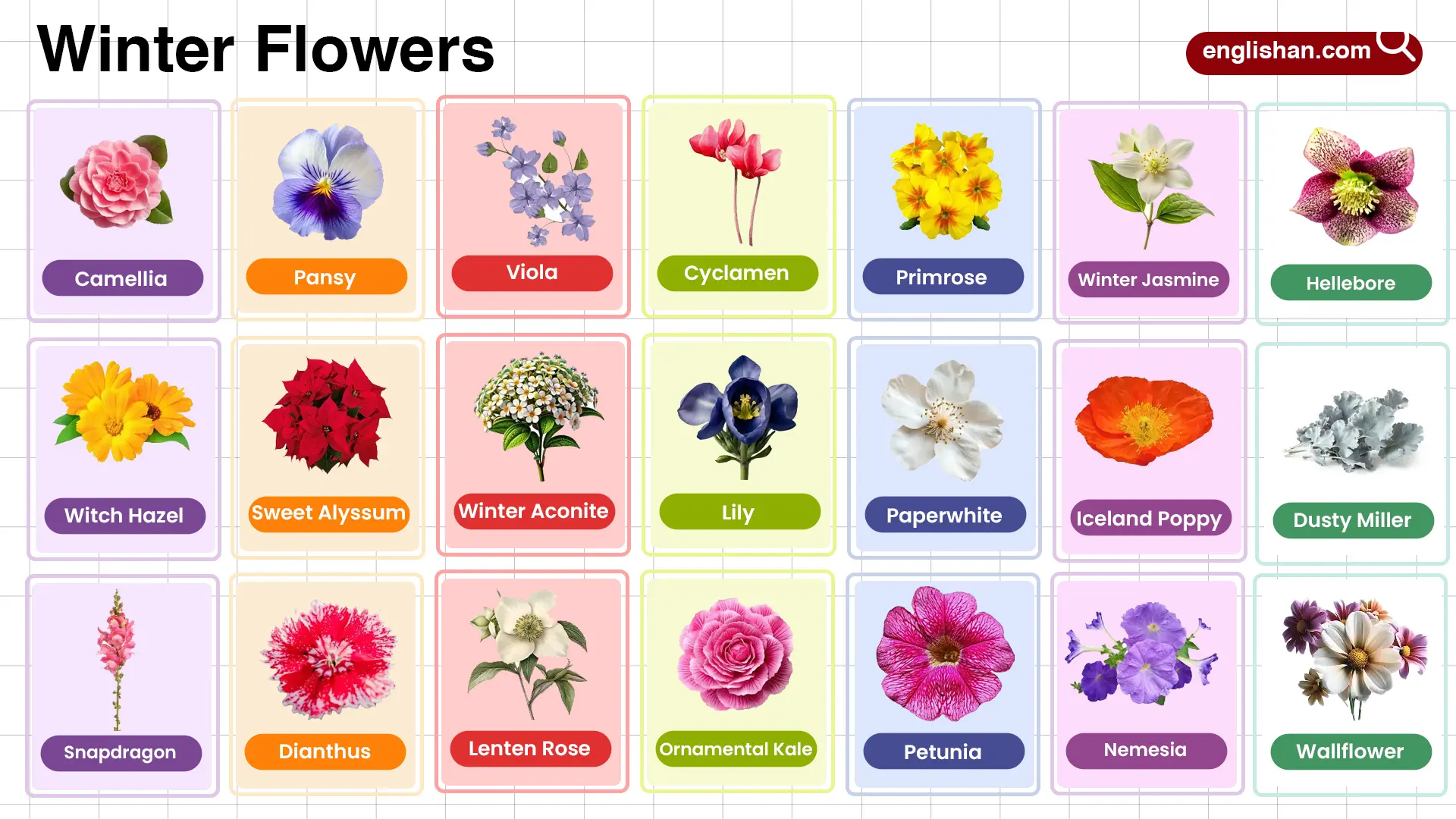Masculine and feminine gender nouns are used to show whether a person, animal, or role is male or female. These gendered words help English learners describe people, animals, and relationships accurately. In this post, you’ll find a list of 100 common gender words, grouped by category—like professions, family roles, and animals. It’s a useful guide for building your vocabulary and learning how to use gender nouns in writing and conversation with confidence.
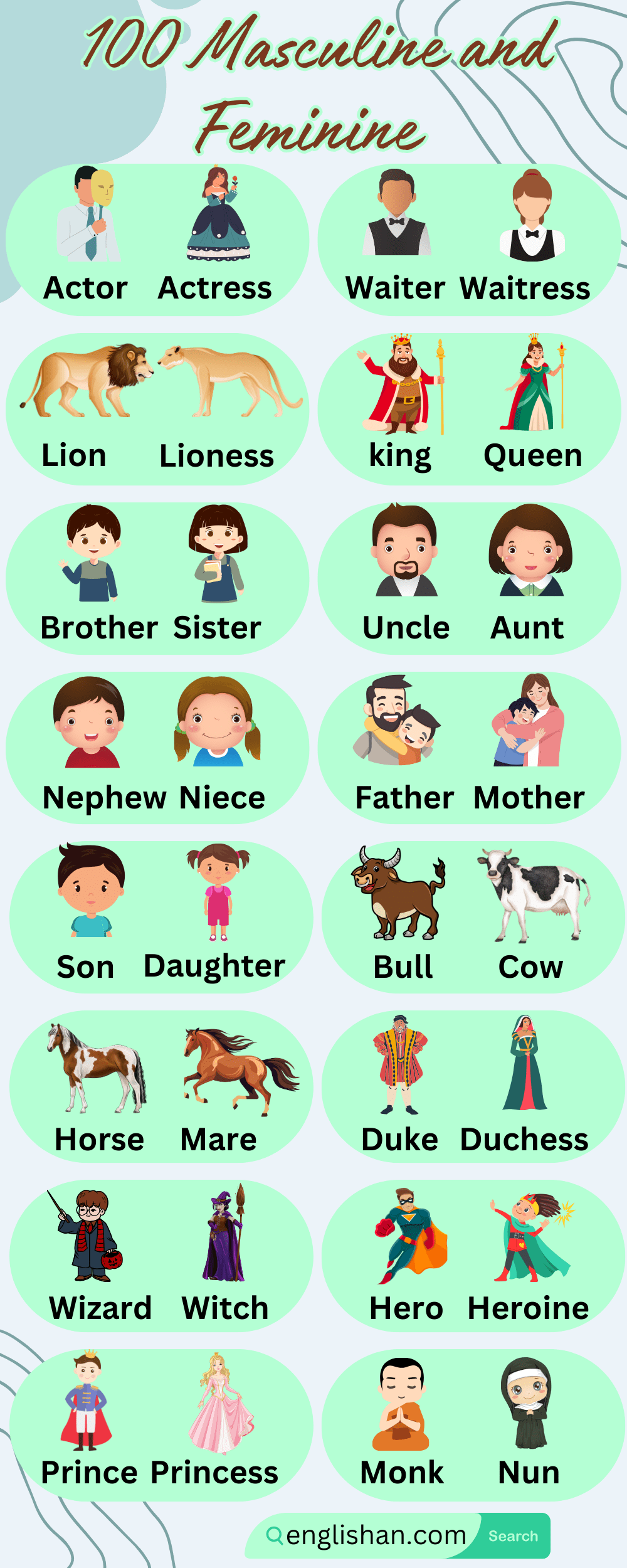
What are Masculine and Feminine Genders?
1. Masculine Gender
Words that refer to male people or animals.
Examples: man, boy, father, king, actor, son, uncle, waiter, nephew, rooster
2. Feminine Gender
Words that refer to female people or animals.
Examples: woman, girl, mother, queen, actress, daughter, aunt, waitress, niece, hen
Difference Between Masculine and Feminine Gender
- Masculine nouns refer to male individuals or animals.
- Feminine nouns refer to female individuals or animals.
- Some nouns have common gender (e.g., teacher, child) where the gender is not specified.
List of Masculine And Feminine Gender
Build your vocabulary with 100 masculine and feminine gender nouns used to describe people and animals in English. The complete list is given below.
- Actor – Actress
- Waiter – Waitress
- King – Queen
- Prince – Princess
- Son – Daughter
- Father – Mother
- Brother – Sister
- Husband – Wife
- Uncle – Aunt
- Nephew – Niece
- Man – Woman
- Boy – Girl
- Sir – Madam
- Gentleman – Lady
- Monk – Nun
- Host – Hostess
- Landlord – Landlady
- Emperor – Empress
- God – Goddess
- Heir – Heiress
- Steward – Stewardess
- Hero – Heroine
- Bachelor – Spinster
- Duke – Duchess
- Baron – Baroness
- Count – Countess
- Czar – Czarina
- Master – Mistress
- Fox – Vixen
- Drake – Duck
- Lion – Lioness
- Tiger – Tigress
- Dog – Bitch
- Bull – Cow
- Ram – Ewe
- Stag – Hind
- Gander – Goose
- Boar – Sow
- Horse – Mare
- Colt – Filly
- Stallion – Mare
- Peacock – Peahen
- Cock – Hen
- Buck – Doe
- Jack – Jill
- Billy goat – Nanny goat
- Tomcat – Queen cat
- He-goat – She-goat
- Rooster – Hen
- Kingfisher – Queenfisher
- Father-in-law – Mother-in-law
- Son-in-law – Daughter-in-law
- Brother-in-law – Sister-in-law
- Policeman – Policewoman
- Postman – Postwoman
- Salesman – Saleswoman
- Businessman – Businesswoman
- Chairman – Chairwoman
- Congressman – Congresswoman
- Councilman – Councilwoman
- Fisherman – Fisherwoman
- Fireman – Firewoman
- Spokesman – Spokeswoman
- Workman – Workwoman
- Mayor – Mayoress
- Prophet – Prophetess
- Jew – Jewess
- Murderer – Murderess
- Host – Hostess
- Shepherd – Shepherdess
- Poet – Poetess
- Sultan – Sultana
- Wizard – Witch
- Reeve – Reevess
- Enchanter – Enchantress
- Lad – Lass
- Friar – Nun
- Sire – Dame
- Testator – Testatrix
- Benefactor – Benefactress
- Tutor – Tutress
- Instructor – Instructress
- Founder – Foundress
- Giant – Giantess
- Leopard – Leopardess
- He-bear – She-bear
- Man-servant – Maid-servant
- Milkman – Milkmaid
- Dancer – Danseuse
- Godfather – Godmother
- Stepfather – Stepmother
- Stepson – Stepdaughter
- Schoolmaster – Schoolmistress
- Headmaster – Headmistress
- Bachelor – Bachelorette
- Lord – Lady
- Wizard – Sorceress
- Mayor – Mayoress
- Poet – Poetess
- Manager – Manageress
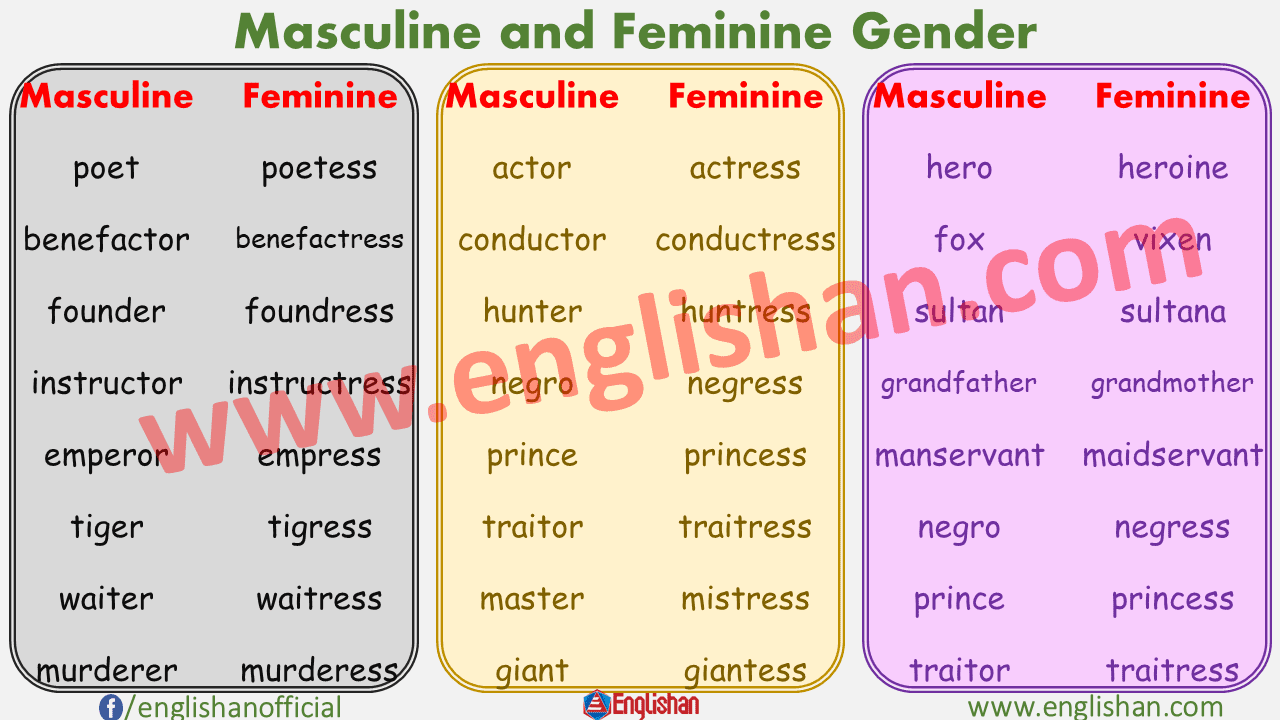
List of 100 Examples of Masculine and Feminine Gender in Animals
Learn animal gender nouns with 100 pairs of masculine and feminine words used to describe male and female animals in English.
- Dog – Bitch
- Lion – Lioness
- Tiger – Tigress
- Fox – Vixen
- Horse – Mare
- Stallion – Mare
- Colt – Filly
- Ram – Ewe
- Bull – Cow
- Boar – Sow
- Stag – Hind
- Gander – Goose
- Drake – Duck
- Cock – Hen
- Rooster – Hen
- Jackass – Jenny
- Jack – Jill
- Billy goat – Nanny goat
- He-goat – She-goat
- Tomcat – Queen cat
- Peacock – Peahen
- Buck – Doe
- He-bear – She-bear
- He-deer – She-deer
- Kingfisher – Queenfisher
- Ram (sheep) – Ewe
- Fox (male) – Vixen (female)
- Lobster (male) – Hen (female)
- Dog (animal) – Bitch
- Elephant (male) – Cow (female)
- Hare (male) – Doe (female)
- Swan (male) – Pen (female)
- Reindeer (male) – Doe (female)
- Goose (male) – Goose (female)
- Mallard – Duck
- Zebra (male) – Mare (female)
- Camel (male) – Cow (female)
- Mule (male) – Molly (female)
- Pig – Sow
- Cat – Queen
- Turkey – Hen
- Parrot – Hen
- Donkey – Jenny
- Cheetah – Cheetah (no fixed gender word)
- Otter – Sow
- Rabbit – Doe
- Ferret – Jill
- Badger – Sow
- Crocodile – Cow
- Snake – No gender distinction
- Whale (male) – Cow (female)
- Alligator – Cow
- Kangaroo (male) – Flyer (female)
- Rat – Doe
- Mouse – Doe
- Wolf – She-wolf
- Beaver – Doe
- Gorilla – Female Gorilla
- Monkey – Female Monkey
- Yak (male) – Dri (female)
- Antelope – Doe
- Llama – Female Llama
- Seal – Cow
- Walrus – Cow
- Bat – No gender noun
- Platypus – No gender noun
- Opossum – Female Opossum
- Wombat – Female Wombat
- Koala – Female Koala
- Moose – Cow
- Bison – Cow
- Buffalo – Cow
- Elk – Cow
- Caribou – Cow
- Ox – Cow
- Toad – No gender noun
- Frog – No gender noun
- Chimpanzee – Female Chimpanzee
- Orangutan – Female Orangutan
- Sloth – Female Sloth
- Hedgehog – Sow
- Mole – Sow
- Armadillo – Female Armadillo
- Skunk – Female Skunk
- Porcupine – Female Porcupine
- Raccoon – Female Raccoon
- Panther – Pantheress
- Leopard – Leopardess
- Hyena – No gender noun
- Deer – Doe
- Reindeer – Doe
- Squirrel – Doe
- Hedgehog – Sow
- Walrus – Cow
- Cow – Bull
- Hen – Rooster
- Lamb – Ewe
- Donkey – Jenny
- Goose – Gander
- Vixen – Fox
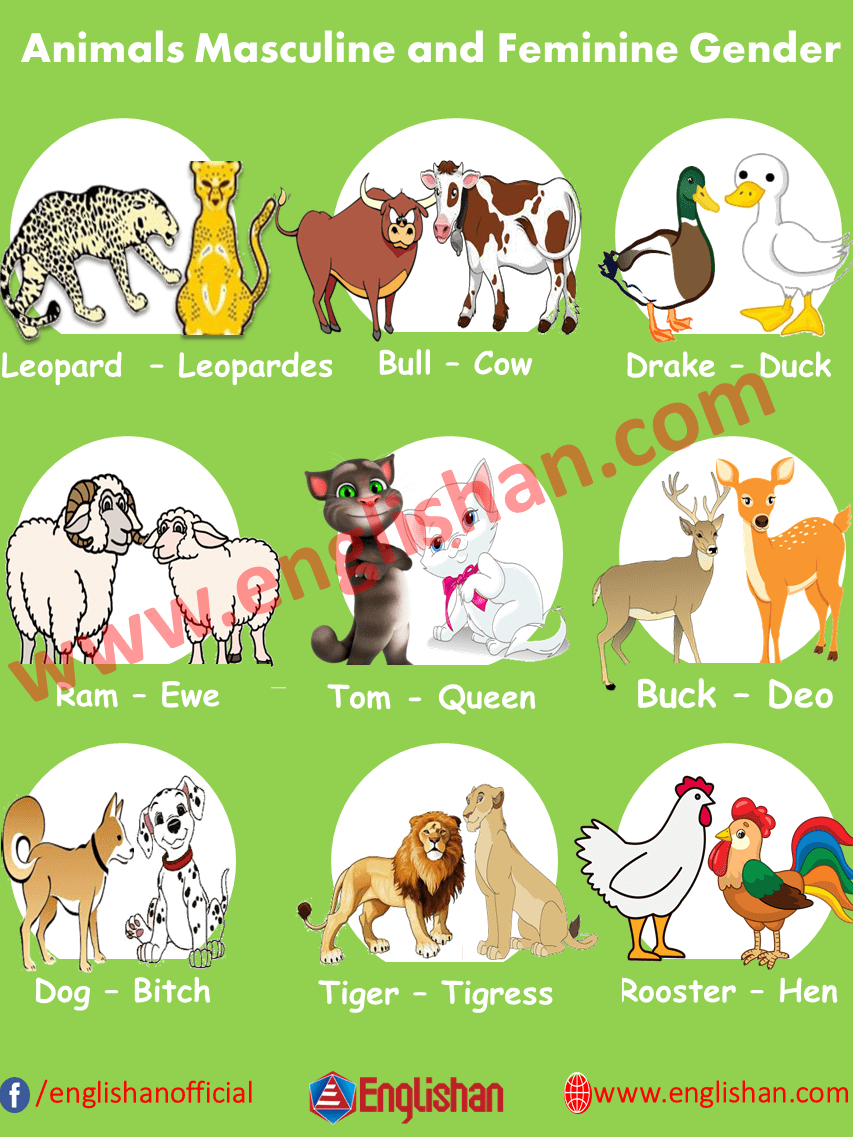
Masculine and Feminine Nouns for People
| Masculine | Feminine |
|---|---|
| Man | Woman |
| Boy | Girl |
| Father | Mother |
| Son | Daughter |
| Uncle | Aunt |
| Husband | Wife |
| Nephew | Niece |
| Brother | Sister |
| King | Queen |
| Gentleman | Lady |
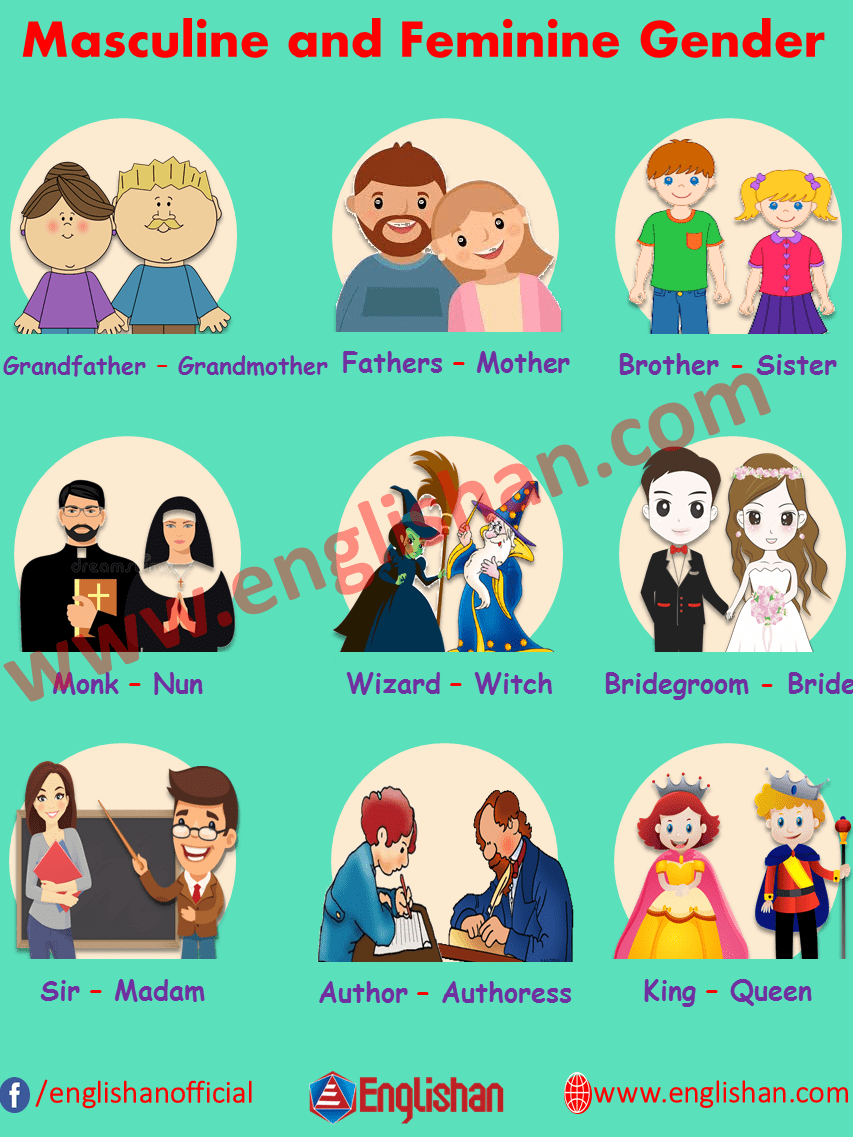
Professions and Roles – Gender Words
| Masculine | Feminine |
| Actor | Actress |
| Waiter | Waitress |
| Host | Hostess |
| Prince | Princess |
| Emperor | Empress |
| Landlord | Landlady |
| Heir | Heiress |
| Steward | Stewardess |
| Hero | Heroine |
| Duke | Duchess |

Gender Nouns That Are the Same for Masculine and Feminine
Some gender nouns remain the same for both males and females. These words are gender-neutral and their meaning depends on the context or pronoun used. Below is a comprehensive list of commonly used gender-neutral nouns:
Professions and Roles
- Teacher
- Doctor
- Student
- Lawyer
- Engineer
- Architect
- Writer
- Chef
- Nurse
- Police officer
- Soldier
- Scientist
- Pilot
- Judge
- Artist
- Athlete
- Coach
- Manager
- Farmer
- Musician
- Dentist
- Pharmacist
- Photographer
- Librarian
- Counselor
- Designer
- Programmer
- Developer
- Translator
- Analyst
- Receptionist
Relationships and Identity
- Parent
- Sibling
- Cousin
- Spouse
- Child
- Guardian
- Partner
- Friend
- Classmate
- Teammate
- Neighbor
- Colleague
- Peer
- Companion
- Roommate
Occupational and Community Titles
- Firefighter
- Mail carrier
- News anchor
- Technician
- Designer
- Cashier
- Cleaner
- Assistant
- Representative
- Volunteer
- Clerk
- Guide
- Operator
- Specialist
- Attendant
- Staff member
- Consultant
- Intern
- Advisor
Animals (Same Gender Term Used) These animals are generally referred to by a single term regardless of gender:
- Fish
- Deer
- Sheep
- Ant
- Butterfly
- Snake
- Frog
- Rabbit
- Chicken (when not specified as hen/rooster)
- Bird (generic use)
- Turtle
- Lizard
- Mouse
- Pig
- Duck (unless specified as drake or hen)
- Insect
- Spider
- Whale
- Dolphin
- Crocodile
These gender nouns that are the same for masculine and feminine are widely accepted in both casual and formal English. They promote inclusive communication and reduce gender bias in speech and writing.. They promote inclusive communication and reduce gender bias in speech and writing.
How to Form Masculine and Feminine Gender
Learn how English gender nouns are formed using suffixes, irregular forms, and word replacements for accurate vocabulary building.
1. By Adding Suffixes to Form Feminine Gender
Some feminine nouns are created by adding suffixes to the masculine form, especially -ess, -ine, -a, and -trix.
Examples:
- Actor → Actress
- Waiter → Waitress
- Lion → Lioness
- Prince → Princess
- Hero → Heroine
- Poet → Poetess
- Steward → Stewardess
- God → Goddess
- Heir → Heiress
- Testator → Testatrix
2. By Using Irregular or Different Words
Many gender pairs have completely different root words or do not follow a fixed pattern. These must be learned as they are.
Examples:
- King → Queen
- Husband → Wife
- Bull → Cow
- Gander → Goose
- Stag → Hind
- Boar → Sow
- Peacock → Peahen
- Fox → Vixen
- Jack → Jill
- Father → Mother
FAQs
Masculine refers to things related to men or boys, and feminine refers to things related to women or girls.
Here are 12 examples of masculine words:
1. Boy
2. Man
3. Father
4. Brother
5. King
6. Husband
7. Son
8. Actor
9. Uncle
10. Prince
11. Gentleman
12. Hero
These words are traditionally associated with males or male qualities.
Here are 12 examples of masculine and feminine words:
Masculine – Feminine
1. King – Queen
2. Father – Mother
3. Brother – Sister
4. Son – Daughter
5. Husband – Wife
6. Uncle – Aunt
7. Actor – Actress
8. Prince – Princess
9. Nephew – Niece
10. Boy – Girl
11. Emperor – Empress
12. Gentleman – Lady
These are traditional gender associations, though roles can be performed by anyone, regardless of gender.
Here are 12 examples of feminine words:
1. Girl
2. Woman
3. Mother
4. Sister
5. Queen
6. Wife
7. Daughter
8. Actress
9. Aunt
10. Princess
11. Lady
12. Heroine
These words are traditionally associated with females or female qualities.
The masculine form of countess is count. A count is a nobleman, while a countess is a noblewoman. These titles are used in some European countries to refer to members of the nobility, often ranking below a duke or duchess.
Mayor is a common gender noun. The same word is used for both males and females.
The masculine gender of goose is gander (pronounced: GAN-der).
You May Also Like
